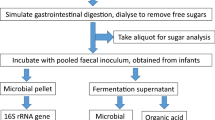Abstract
IN the last few years much work has been done, mostly in the United States, on the effect of sulphonamide drugs on the synthetic activities of intestinal bacteria. These studies have yielded valuable information about the synthesis of vitamins and other substances in the gut and their availability to the host. As experimental animals, rats receiving purified diets supplemented with various vitamins have been largely used. It has occurred to us that rats displaying the phenomenon of refection1,2,3, that is, the ability to grow and thrive in the absence of the vitamin B complex from the diet, would be particularly suitable for such work. Refected rats are entirely dependent on their symbiotic microflora for the supply of certain essential factors ; any interference, therefore, with the activities of these microorganisms can be easily detected. In the absence of an exogenous supply, metabolic balances of vitamin synthesis and utilization become possible with refected animals. Finally, refection renders rats in some respects akin to ruminants4, and a study of digestive phenomena in the refected rat may help to throw some light on these processes in the bovine.
This is a preview of subscription content, access via your institution
Access options
Subscribe to this journal
Receive 51 print issues and online access
$199.00 per year
only $3.90 per issue
Buy this article
- Purchase on Springer Link
- Instant access to full article PDF
Prices may be subject to local taxes which are calculated during checkout
Similar content being viewed by others
References
Fridericia, L. S., Freudenthal, P., Gudjonnsson, S., Johansen, G., and Schoubye, N., J. Hyg., Camb., 27, 70 (1927–28).
Roscoe, M. H., J. Hyg., Camb., 27, 103 (1927–28).
Kon, S. K., and Watchorn, E., J. Hyg., Camb., 27, 321 (1927–28).
Kon, P. M., Kon, S. K., and Mattick, A. T. R., J. Hyg., Camb., 38, 1 (1938)
White, H. J., Johns Hopkins Hosp. Bull., 71, 213 (1942).
Folley, S. J., Ikin, E. W., Kon, S. K., and Watson, H. M. S., Biochem. J., 32, 1988 (1938).
Najjar, V. A., Johns, G. A., Medairy, G. C., Fleischmann, G., and Holt, L. E., jun., J. Amer. Med. Assoc, 126, 357 (1944).
Kon, S. K., Proc. Nutr. Soc, 3, 217 (1945).
Schweigert, B. S., Mclntyre, J. M., Henderson, L. M., and Elvehjem, C. A., Arch. Biochem., 6, 403 (1945).
Black, S., McKibbin, J. M., and Elvehjem, C. A., Proc Soc Exp. Biol., N.Y., 47, 308 (1941).
Mackenzie, J. B., Mackenzie, C. G., and McCollum, E. V., Science, 94, 518 (1941).
Mickelsen, 0., Doeden, D., and Keys, A., Fed. Proc., 4, 98 (1945).
Author information
Authors and Affiliations
Rights and permissions
About this article
Cite this article
COATES, M., HENRY, K., KON, P. et al. Sulphonamides and Potato Starch Refection in the Rat. Nature 157, 262–263 (1946). https://doi.org/10.1038/157262a0
Issue Date:
DOI: https://doi.org/10.1038/157262a0
This article is cited by
-
Vitaminmangelerscheinungen bei Hauterkrankungen und die Rolle der Biosynthese bei solchen Mangelzust�nden
Archiv f�r Klinische und Experimentelle Dermatologie (1957)
Comments
By submitting a comment you agree to abide by our Terms and Community Guidelines. If you find something abusive or that does not comply with our terms or guidelines please flag it as inappropriate.


